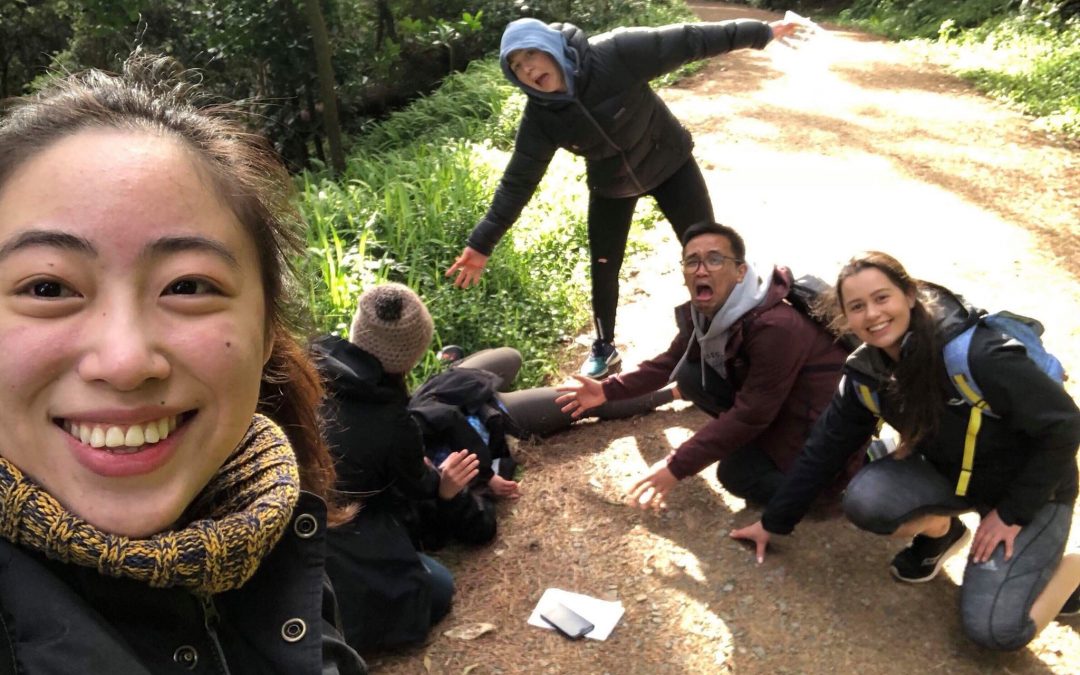On the 8th of September a group of Wellington’s 4th and 5th year medical students took part in Wilderness Workshop. Held in the medical school and the Mt Victoria town belt, it was a rip-roaring day full of practical workshops, interesting presentations, and challenging scenarios with a rogaine thrown in at the end for good measure. The students were in safe hands with a team of awesome tutors helping them out and sharing their wealth of knowledge and experience.
The students spent the morning rotating through three different tutorials. Buzz Burrell and Jo Scott-Jones led a tutorial on trauma triage. Buzz and Jo got the students to role-play trauma victims and the doctors tasked with triaging them, causing an absolute ruckus in the medical school foyer in the process. Everyone walked away from this with not only a better understanding of how to approach a mass casualty but also with a fair amount of permanent marker on their faces – all part of the learning process.
Meanwhile Shaun Counsel gave an informative tutorial on hypo and hyperthermia, focussing on the tell-tale signs and management strategies for these conditions. The students worked through a hypothermia scenario helped by some fabulous acting from Branko Sijnja who took time out of caring for his RMIP students to take part in the workshops.
Annie Silvester, Dick Price and Petra Watson led the final tutorial which focussed on improvised carries and fixing fractures, drawing on their extensive knowledge in the field and Dick’s amazing never-ending first aid kid.
We took a break for morning tea and lunch which provided a great opportunity for the students to chat to the tutors and get an idea of the scope of their experience and expertise in their relative fields. It was great to see everyone mingling and discussing the morning together.
After lunch we began a series of talks. Branko presented on the history of rural medicine, especially in the Clutha district, along with some of the benefits of the rural hospital approach to community centred patient care. Michelle Balm joined us from the infectious diseases department to give a detailed talk on the various causes of fever in a returned traveller. If nothing else, I’m sure at least some of us are now a little more paranoid about our summer travel plans. Shaun then shared some of the lessons he learned while acting as the team doctor on expeditions to Kilimanjaro and Everest base camp. These included trip preparation, identification and management of Acute Mountain Sickness, and the ethical issues faced by doctors practicing in these conditions, such as whether to treat people outside of the party and weighing up when it’s time to turn back. Dick Price finished off this portion of the afternoon by giving a wide-ranging talk on his extensive experience practicing in alpine environments. He also shook out his pack and explained the uses of some of the more specialised equipment he carried with him on these adventures.
At this point it was time for the students to put their new-found skills to the test in an exciting race up and around Mt. Vic. Leaving from the med school, two teams of students raced up to complete four scenarios before beginning the permanent rogaine course set up by the Wellington Orienteering Club. In order to move on to the rogaine the teams first had to complete each scenario to an acceptable standard. The scenario cases included; managing a hypothermic patient, organising an improvised carry in a patient with a broken leg, dealing with an unconscious diabetic patient with limited equipment and stabilising and moving a patient with possible fractures in their neck and pelvis. Although the day was bright and sunny the wind was pretty brisk so thank you to all the tutors and volunteers who braved the cold.
After receiving their case feedback the students ran off in their teams to complete the rogaine, keeping in mind that they risked point deduction if they returned to the med school after the finish time. It was a sweaty and adventurous way to finish a day packed with Rural and Wilderness medicine.
This day wouldn’t have been possible without the generosity of a number of people and groups, so I have a few acknowledgements to dish out. Thank-you very much to all the tutors who took time out of their busy schedules to lend their enthusiasm to the education of the students who took part in the workshop. Thank you to the University of Otago Wellington for the use of tutorial rooms and lecture theatres and thank you to everyone who helped to plan this event. Lastly, there’s no way this event could have gone ahead without the financial support from the New Zealand Institute of Rural Health (NZIRH), the Rural Medical Immersion Programme and from New Zealand Rural General Practice Network (NZRGPN) so thank you very much to these groups for your support of this Workshop.
I can’t wait to see how the Wilderness event for 2019 shapes up!
Christina Grove- WHPSA rural rep.

